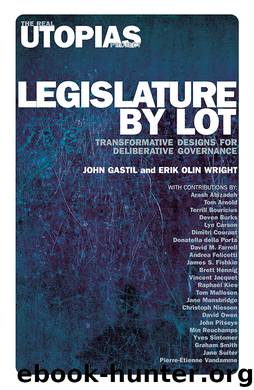Legislature by Lot by John Gastil & Erik Olin Wright

Author:John Gastil & Erik Olin Wright
Language: eng
Format: epub
Publisher: Verso Books
Conclusion
I have offered several suggestions for how to achieve a deliberative process within a sortition chamber, as well as beyond it, by drawing it closer to the wider public. In doing so, I drew on my experience at newDemocracy and as an observer of numerous minipublics and other public events. The proposed sortition chamber, however, raises questions that this limited knowledge base cannot answer.
Most of all, newDemocracy’s minipublics are one-off events with the longest spanning several months. What happens when a randomly selected group is convened over a much longer period—years instead of months? How might the group dynamics change? Anticipating such changes will have an impact on the deliberative design—a fascinating challenge for any deliberative designer.
Are randomly selected citizens to become modern-day philosophers, recalling Plato’s belief that only philosophers should rule?44 Being philosophical is consistent with the principles of deliberative democracy, which calls for interrogating evidence and questioning everything, including one’s own biases. Might this overcome the “corporate coup” occurring in some Western democracies by replacing power seekers with deep thinkers?45
More than anything, the overarching question should be, “What can this assembly contribute to a democracy?”46 The shift from a self-selected, political-party-dominated assembly will make a significant contribution to democracy, but this will be insufficient. We know that the architecture of government, by its very design, can lead to democratic deficits.47 Institutional structures must be supported by process design that enables collaboration to surface, and a willingness to partner for the benefit of all.
Gastil and Wright were alert to this, and their suggestions about orientation and training of new representatives will be essential, as will be effective staff support. Gastil and Wright have also recommended an oversight commission. This could be modeled on Australia’s successful state-based Independent Commission Against Corruption. Or if we want to persist with wider involvement of citizens, then citizens’ parliamentary groups could work well as monitors or overseers.48
Above all else, I hope this chapter serves as a call to action. We must avoid seeking only a change in representation by simply substituting randomly selected citizens for elected ones and blithely assuming an entirely different outcome. In any such reform, careful process design will be essential. What happens in an assembly—how decisions are to be made—is of equal importance to how those representatives are selected. Process design can make or break a sortition assembly. Attention must be paid to methods that enable legislators to come to judgment, not merely how to count their personal opinions through voting. Genuine deliberation will be imperative to restore trust in the workings of government.
Download
This site does not store any files on its server. We only index and link to content provided by other sites. Please contact the content providers to delete copyright contents if any and email us, we'll remove relevant links or contents immediately.
| Anarchism | Communism & Socialism |
| Conservatism & Liberalism | Democracy |
| Fascism | Libertarianism |
| Nationalism | Radicalism |
| Utopian |
The Secret History by Donna Tartt(19052)
The Social Justice Warrior Handbook by Lisa De Pasquale(12187)
Thirteen Reasons Why by Jay Asher(8893)
This Is How You Lose Her by Junot Diaz(6877)
Weapons of Math Destruction by Cathy O'Neil(6264)
Zero to One by Peter Thiel(5786)
Beartown by Fredrik Backman(5737)
The Myth of the Strong Leader by Archie Brown(5499)
The Fire Next Time by James Baldwin(5431)
How Democracies Die by Steven Levitsky & Daniel Ziblatt(5215)
Promise Me, Dad by Joe Biden(5141)
Stone's Rules by Roger Stone(5081)
A Higher Loyalty: Truth, Lies, and Leadership by James Comey(4954)
100 Deadly Skills by Clint Emerson(4921)
Rise and Kill First by Ronen Bergman(4779)
Secrecy World by Jake Bernstein(4741)
The David Icke Guide to the Global Conspiracy (and how to end it) by David Icke(4706)
The Farm by Tom Rob Smith(4502)
The Doomsday Machine by Daniel Ellsberg(4484)
